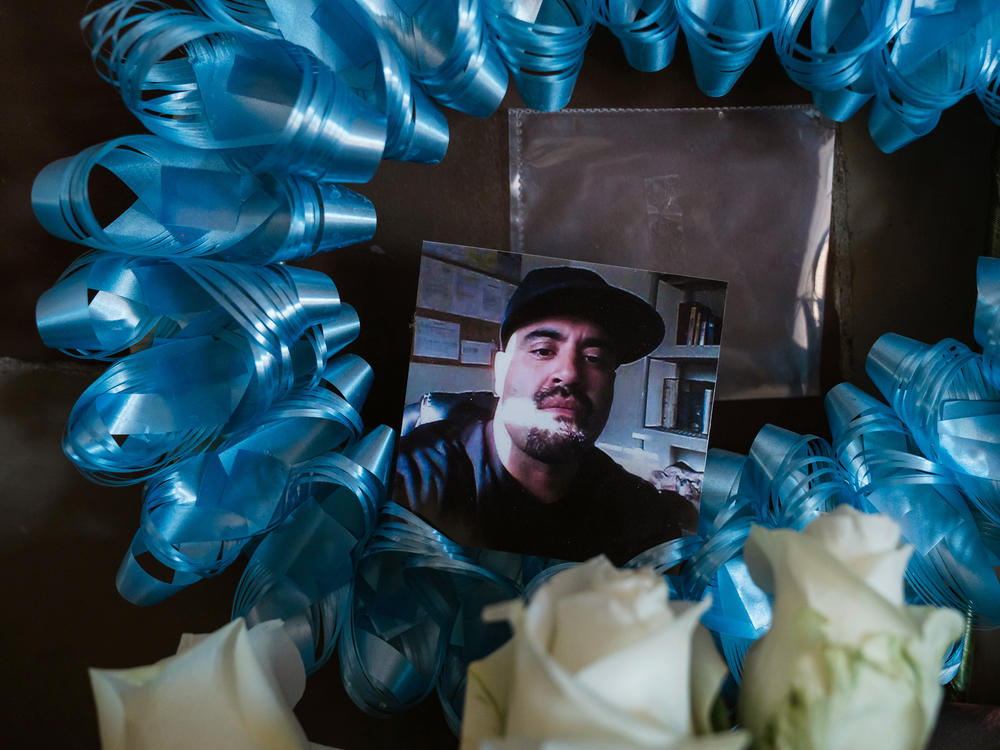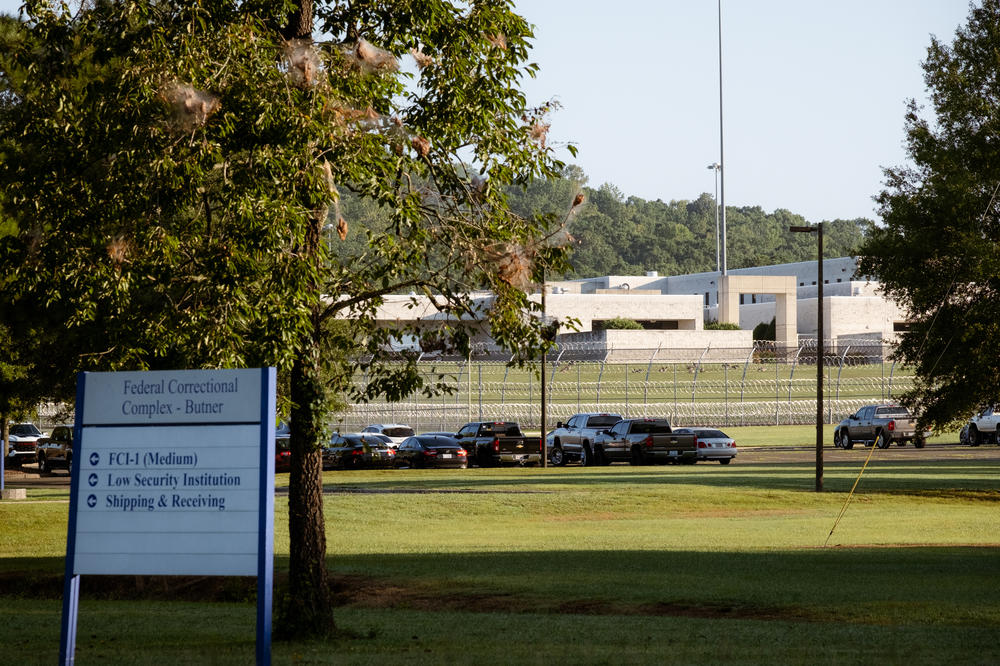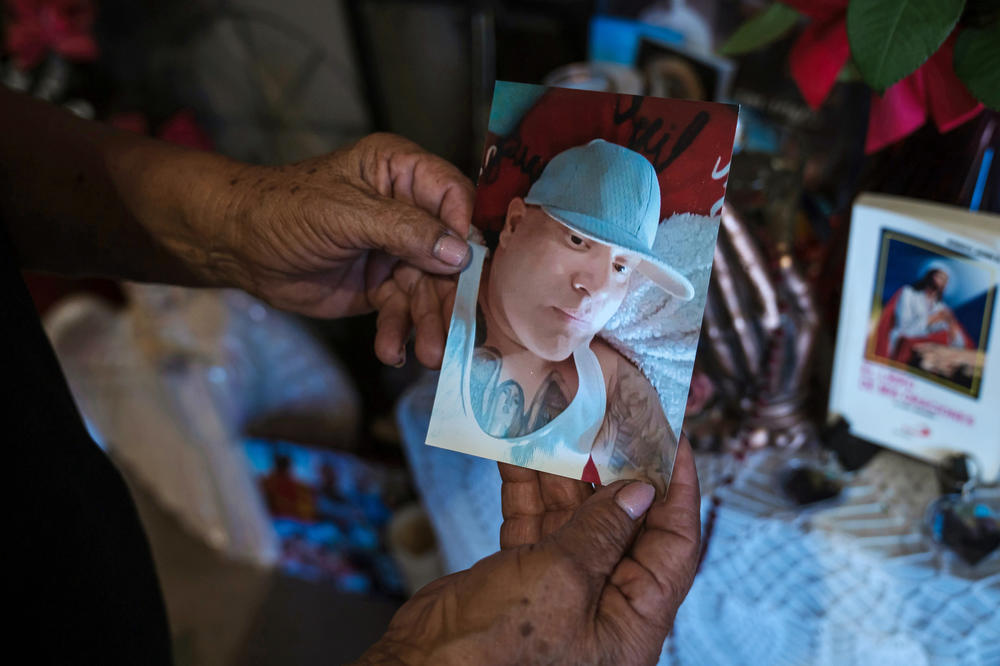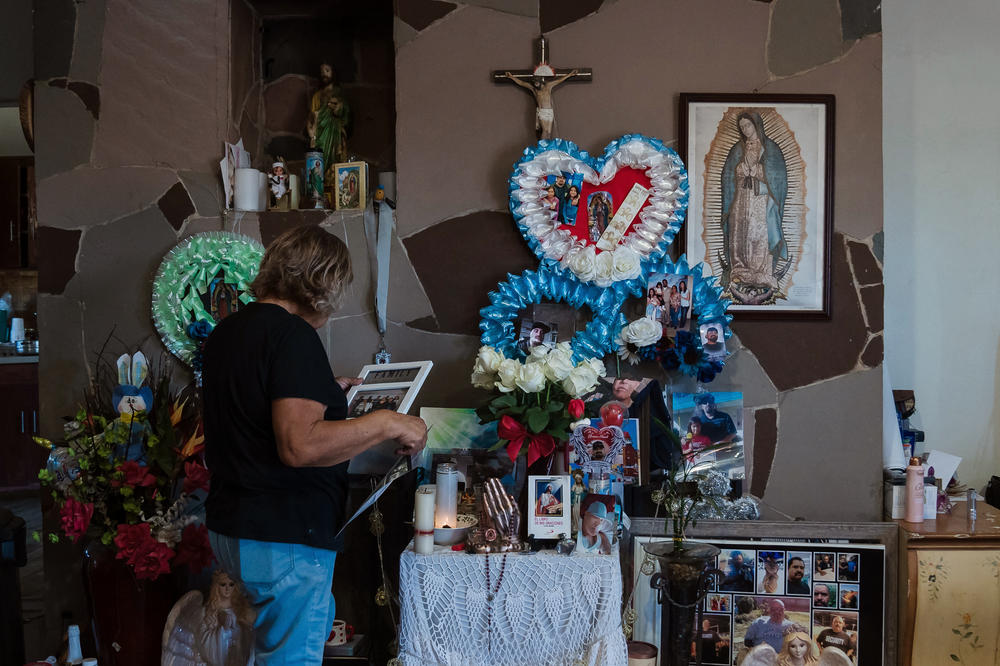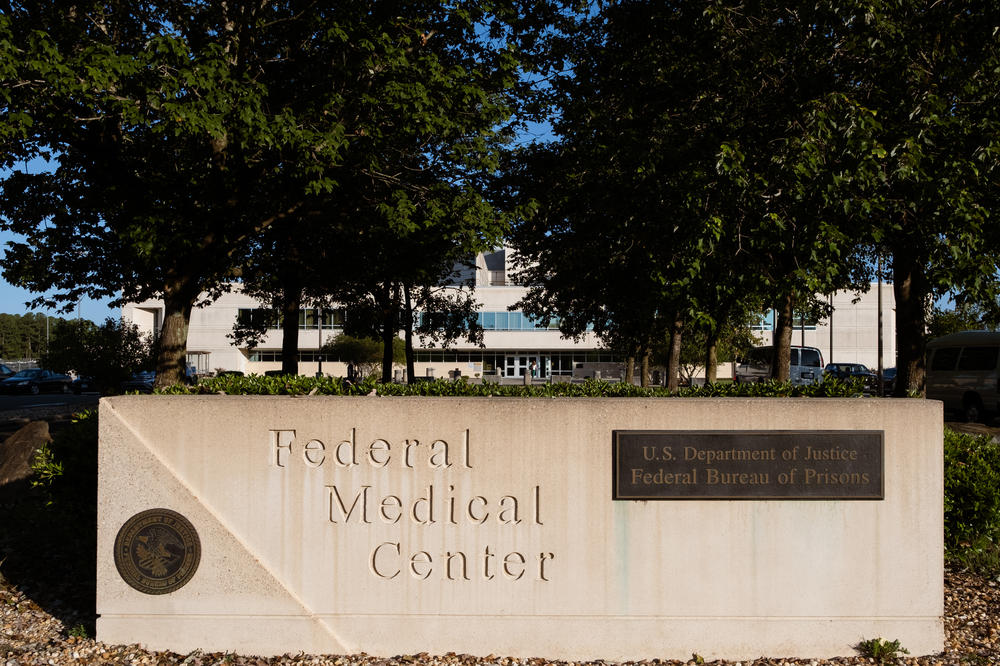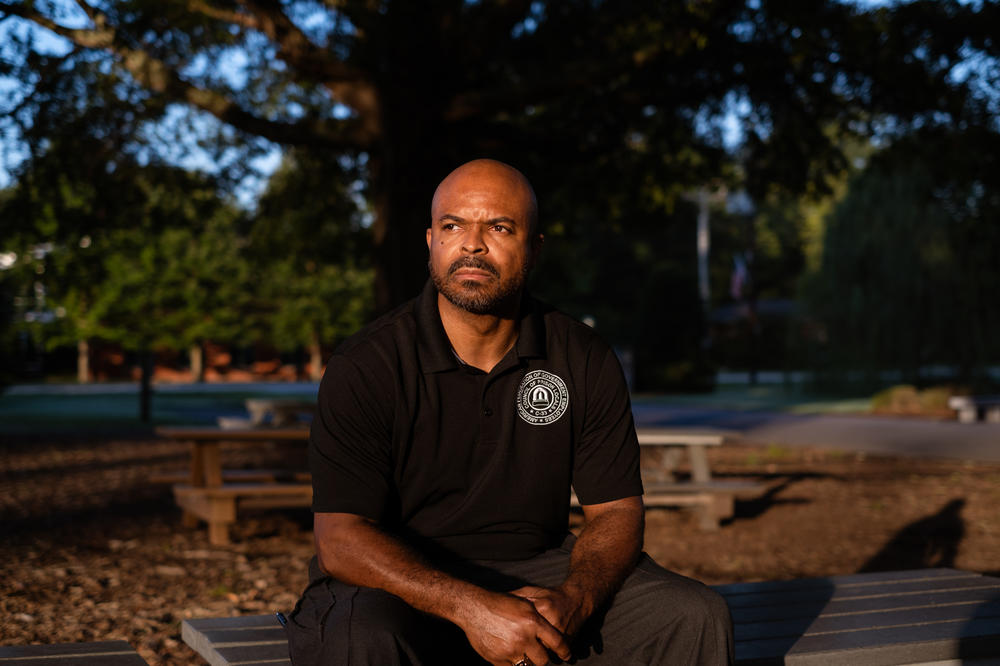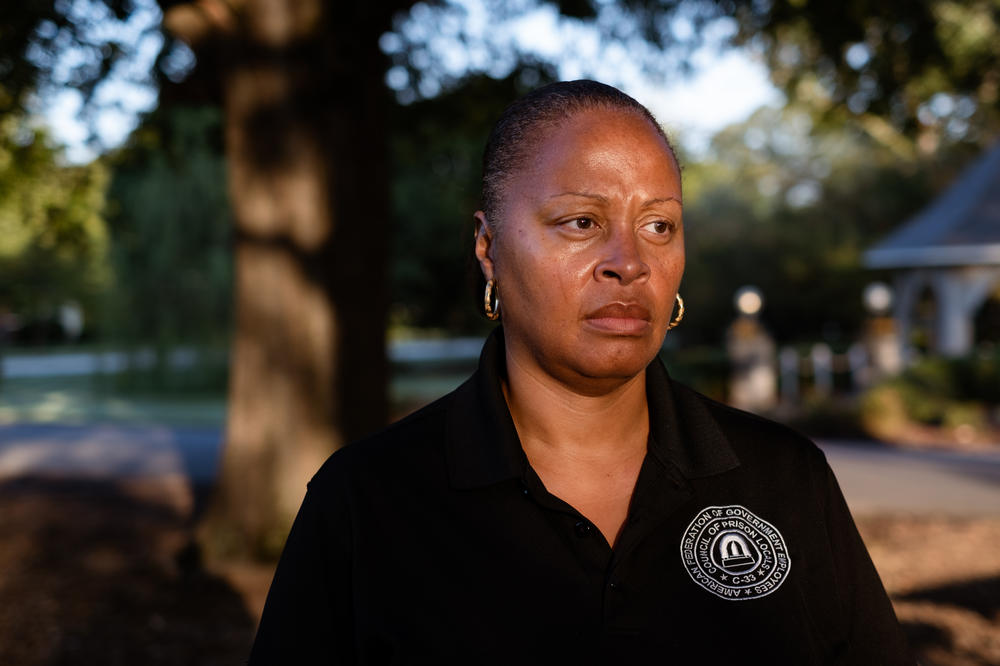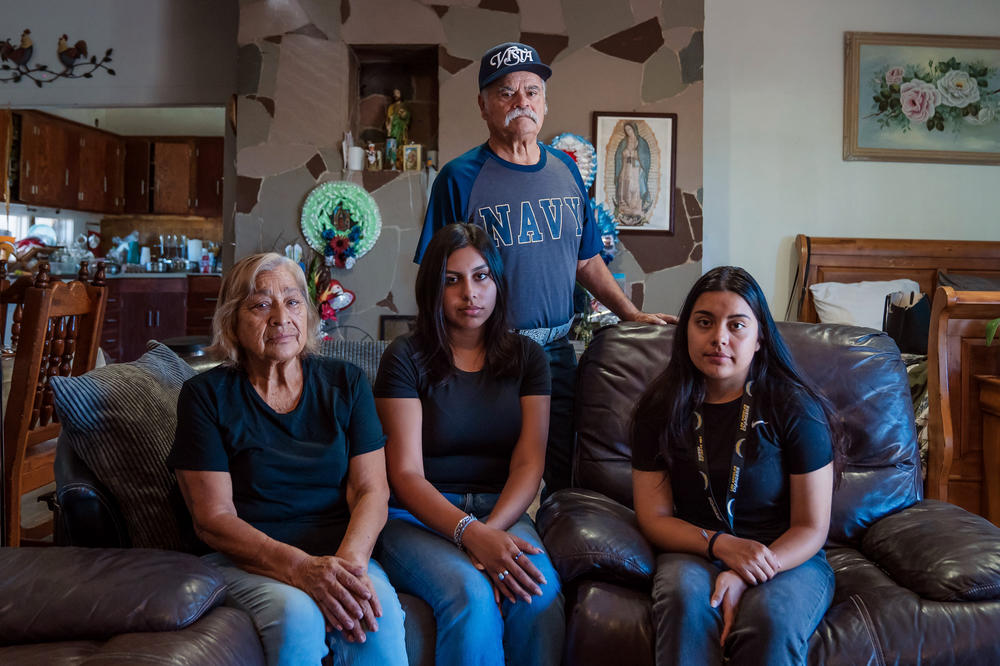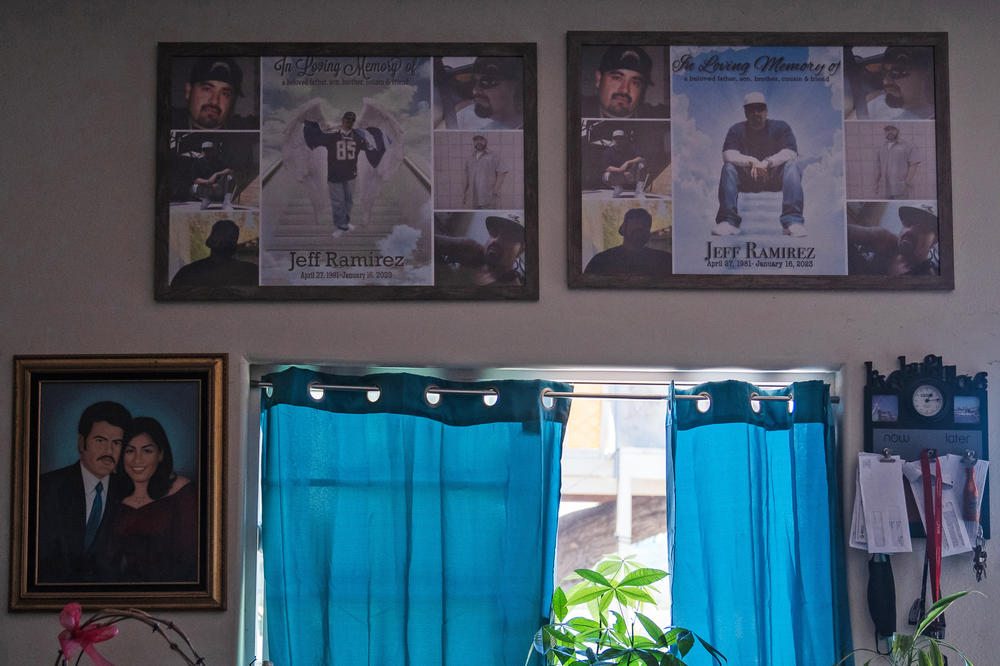Section Branding
Header Content
1 in 4 inmate deaths happens in the same federal prison. Why?
Primary Content
Ever since his release from federal prison, Jeffrey Ramirez had been waiting to die.
He passed the time at his parents' home near San Diego, doting on his mom and watching movies with his teenage daughters. But his doctors had recently told him they'd run out of options for treating his cancer.
"I can go almost about any day. I can go tomorrow. I can go a week from now, a month from now. It's all on God," he told NPR. "I try not to think about it. It hurts."
He was focused on managing his pain — and his anger.
"I'm ticked off. I'm mad," he said. "There's a lot of emotions and there's, like, what-ifs."
What if, he wondered, he could have seen a doctor right away when he first felt an inkling that something was wrong, instead of waiting more than a year for prison officials to take him to one?
"I know myself. That's the first place I would go — I'd go to the doctor. This would not happen," he said. "I'm angry because it didn't have to get this far."
Eleven days after that interview this past January, Ramirez died at age 41.
NPR looked into the deaths of people like Ramirez, who died during or shortly after their time in federal prison. Records obtained from the Bureau of Prisons (BOP) show at least 4,950 people died in its custody over roughly the past decade. Although there are more than 120 federal prisons nationwide, a quarter of those deaths occurred in a single place: the Butner Federal Correctional Complex in Butner, North Carolina. Ramirez was there in the months before his release.
More deaths at Butner are to be expected. The complex includes a federal medical center (FMC), which is essentially a prison hospital. Inmates who need intensive medical care often end up at one of these hospitals, and FMC Butner is the bureau's largest cancer treatment facility. According to NPR's analysis, more people in BOP custody died of cancer than any other cause from 2009 to 2020.
But looking closer at the experiences of individual people, NPR found numerous accounts of inmates nationwide going without needed medical care. More than a dozen waited months or even years for treatment, including inmates with obviously concerning symptoms: unexplained bleeding, a suspicious lump, intense pain. Many suffered serious consequences. Some, like Ramirez, did not survive.
Too often, sources told NPR, federal prisons fail to treat serious illnesses fast enough. When an ailment like cancer is caught, the BOP often funnels these sick inmates to a place like Butner, where it is assumed they'll receive more specialized treatment. But by the time prisoners access more advanced care, it's sometimes too late to do much more than palliative care. What's more, current and former inmates and staff at Butner told NPR the prison has issues of its own, including delays in care and staffing shortages.
The Bureau of Prisons claims to meet the same medical standards as any independent hospital, stating on its website that it is accredited by the nation's leading accreditation agency. But NPR found that, in fact, the BOP's certification lapsed two years ago.
Sources NPR interviewed say all this leads to a troubling conclusion: Federal inmates — a group with a constitutional right to health care yet without the autonomy to access it on their own — are dying more often than they should.
"Deaths in custody should be rare events, given that this is such a controlled environment," says Michele Deitch, director of the University of Texas at Austin's Prison and Jail Innovation Lab.
"Are there preventable deaths happening in the BOP? The answer to that is clearly yes."
The BOP declined NPR's request for an interview and declined to comment on individual cases, but it wrote in a statement that the bureau is "committed to providing safe, effective healthcare that is clinically appropriate" and that it "makes a proactive effort to screen and identify disease at its earliest stages."
"What took them so long to get to us?"
In addition to gathering and analyzing data from the federal government, NPR reviewed court and medical records and interviewed inmates, lawyers, families and bureau employees while looking into the stories of patients in federal prisons. Ramirez was far from the only person NPR identified who didn't get timely medical care while in federal prison.
- Angela Beck, a 47-year-old at the time with a family history of breast cancer, discovered lumps in her left breast while in federal prison in Aliceville, Ala., and asked to see a doctor. After receiving imaging results "'highly suggestive' of cancer," according to an opinion issued by a federal judge, she waited more than eight months for a biopsy, which confirmed the cancer. Another two months passed before she got surgery, during which doctors confirmed the disease had spread to her lymph nodes. Beck then waited another five months before she saw an oncologist. By that time, it was too late to start chemotherapy or radiation. A federal judge granted her release in June 2019.
- Michael Derentz, a 70-year-old inmate at the Fort Dix federal prison in New Jersey, was granted compassionate release in 2022 after a federal judge found the BOP's repeated delays in care "disturbing." "Delays in securing urgently needed follow-up appointments contributed to Derentz becoming blind in his left eye," the judge wrote.
- Joseph Guadagnoli died of cancer while in custody at the federal prison in McDowell County, W.Va., in July 2022, after complaining of a litany of ailments. By the time doctors diagnosed his cancer in May of that year, it was too late for treatment, his brother Michael Guadagnoli said. On Sept. 7, 2020, records show, Joseph wrote a sick call request to staff: "My conditions are getting worse. I need to be seen soon." On Oct. 10: "This is taking a psychological toll on me — what do I have to do to be seen — to get attention?" On Dec. 1: "I cannot breathe. ... I have been asking for seven months."
- In April 2020, Turhan Law began having nosebleeds several times a day at the federal prison in Loretto, Pennsylvania. According to a compassionate release motion filed by his lawyer, that bleeding continued for months before prison officials took him to a hospital. In the summer of 2020, a biopsy confirmed squamous cell carcinoma, a type of cancer. But by the time Law arrived at Butner in November of that year, no treatment plan had been started, according to a supplemental motion filed in support of Law's release request. In December 2020, a month after the BOP sent Law to Butner, a federal judge granted his request for release, citing in part the delays in care Law experienced.
- Michael Boughner, a federal prisoner at the U.S. penitentiary in Florence, Colo., complained of horrible headaches for at least five weeks before he saw a doctor, his mother, Linda Renta, said. "He fainted four or five times, and the guards were convinced he was faking it," Renta said. "They found that he had a tumor in his brain the size of an egg." The BOP sent Boughner to Butner, where he lived for about five months before, prison records show, he died of cancer at age 50 in March 2019.
Like Ramirez, Boughner and Law were transferred to Butner for cancer treatment. A current medical staff member at Butner who requested that her name not be used for fear of retaliation said she has heard stories like theirs "so many times."
"So many inmates have told me, 'I complained about this lump, or I complained about this pain for so long, and they only gave me cream, they only gave me Motrin, they never sent me out for tests or anything. Now they send me here and I have Stage 3 or Stage 4 cancer,'" she said. "Our question is always: What took them so long to get to us, and why did they send them to us when there's nothing that we can do?"
The staff member told NPR that she has seen many patients for whom nothing could be offered beyond palliative care. "What is shocking and frustrating is when a patient has an issue where death could have been prevented had they received the medical care in a timely manner," she added.
Art Beeler, a former Butner warden, said it was hard for him and his staff to see inmates arrive at the prison with late-stage cancer.
"It did not happen every day or even every week, but there were cases we received late, and every one of them were frustrating," Beeler told NPR. "If we received someone who had Stage 4 prostate cancer, who showed indicators early on in the process, we were very frustrated. ... We knew more than likely the patient would live if they had received treatment early on."
Elizabeth Blackwood, counsel and director for the First Step Act Resource Center at the National Association of Criminal Defense Lawyers, says whether a person in custody can get the medical care they need should be considered at sentencing, before they ever set foot in a prison.
"What type of punishment are we really wanting to dole out on people? Because none of these people had death sentences," she said. "None of these people were sentenced to excruciating pain and torture while they aren't getting the medical treatment and not getting relief from their painful cancer, but yet that's being inflicted on them every day on a regular basis."
"It just fell through the cracks"
Jeffrey Ramirez estimated he first felt the smallest trace of a lump in his left testicle in the summer of 2020.
"I remember when I was younger, I was told once you get to a certain age, you should check yourself. And so that's exactly what I did," Ramirez said. He was 39 at the time and had been sentenced to 10 years in prison in January of that year for intent to distribute methamphetamine and a related weapons charge.
The lump was about the size of a BB, not even a quarter of an inch in diameter, he said.
"I put in a medical slip, and they didn't really pay much attention," he said. "I didn't really push it because I didn't think it was anything serious."
By early 2021, he had been transferred to the federal prison in Phoenix to serve out his time. At that point, his testicle had grown considerably. He filled out an "Inmate Request to Staff" form, sometimes called a cop-out.
"I've been putting in multiple cop-outs about my medical problem and I haven't been seen," Ramirez wrote to the prison's health services staff on Jan. 19, 2021. "My left testicle is becoming unbearable. I need help, please help me."
When a medical staff member saw him a week later, the staff member noted a possible hernia and ordered an ultrasound. On Feb. 2, he was seen again. This time, a nurse practitioner ruled out a hernia but observed that the left testicle was "much larger" than the right one and firm to the touch, according to prison medical records obtained by NPR. The nurse practitioner scheduled an ultrasound for about two weeks later and listed the priority as "urgent."
But nearly four months went by — and no ultrasound. On May 23, Ramirez wrote to staff again: "I'm requesting medical attention for my left testicle. This has been an ongoing issue and haven't received any further medical attention. My testicle has grown more in size and I have pain shooting through my testicle to the left side of my stomach and even my lower left back."
Two days later, a nurse wrote back: "You have an ultrasound pending."
Ramirez wrote again about a week later and was told again that an ultrasound was being scheduled and to take ibuprofen and Tylenol. All of June went by. Then all of July. He was seen on Aug. 3, and another ultrasound, labeled again as urgent, was scheduled, this time for September. But that ultrasound never came either.
"It was like getting kicked in the groin that whole time. I got to the point where it was really uncomfortable. I couldn't even sit down," Ramirez told NPR. "When I asked the assistant warden, she told me to 'trust the process.'"
By the time Ramirez saw a specialist out in the community, it was January 2022 — more than a year after he first started complaining.
"While I was there, they did the ultrasound and whatnot, and they're like, 'OK, you can go,'" Ramirez recalled. "So I'm on the way out and all of a sudden I see three nurses running out towards us like, 'Uh, you're not going anywhere. You need to be admitted.' And that's when I found out that I had cancer."
Doctors diagnosed him with Stage 3C testicular cancer, the final stage of the disease. By then, it had spread to his brain and lungs.
Two months later, in March 2022, Ramirez started a first round of chemotherapy and had surgery to remove his left testicle. About two weeks after that, prison officials transferred him to Butner.
Early detection is especially important in treating testicular cancer. If the disease is caught early, the cure rate is as high as 98%. But a delay in diagnosis of more than six months is an independent predictor of a lower chance of survival, says Dr. David Vaughn, a genitourinary oncology professor at the University of Pennsylvania.
Vaughn did not treat or diagnose Ramirez, but he stressed that any patient with a firm, enlarged testicle — like what Ramirez had — should get an ultrasound as soon as possible.
"Honestly, if someone comes into our emergency room with this complaint, they get an ultrasound while they're in the emergency room. If someone's going to see their primary care doctor, one would expect that the ultrasound would be done within a few days," Vaughn said. "That's the standard. That's what happens every day in America."
Yet that's not even close to what Ramirez experienced.
"It just fell through the cracks," says Zandra Lopez, a federal public defender who represented Ramirez. "Jeff's case was obvious, but we've seen it in a lot of our cases. It seems to be something systemic that's happening in all of the BOP prisons."
"When our clients are requesting help, the internal medical staff recognize that these people need to go out to a specialist," she added. "But it goes in this hole. And I don't understand why they're not being seen. And by the time they do, it's oftentimes too late."
There's evidence to back that up. Several studies suggest the risk of dying from cancer may be higher behind bars and in the time shortly after inmates are released.
"I don't want to be one of those statistics"
When Bernie Madoff, who orchestrated the largest Ponzi scheme in U.S. history, was sent to Butner in 2009, a prominent criminal defense attorney said Madoff "hit the inmate lottery" by landing in what he called the "crown jewel" of the federal prison system. But the stories of patients at Butner suggest inmates don't always receive the better care that might have been expected there.
In January 2009, doctors at Butner noted a lesion on inmate Greg Baker's penis during a surgery for a narrowing of his urethra. At the time, a pathology report indicated the lesion's cells were abnormal and should be watched. During the next few months, doctors evaluated Baker frequently, but the lesion wasn't biopsied until July, when he was diagnosed with a rare form of cancer. In September, doctors partly removed Baker's penis. He sued the BOP after his release, but a federal judge ruled in the government's favor, saying Baker had not shown that the outcome would have been any different had he gotten care earlier.
"Greg went into prison a healthy man," Jay Hurst, Baker's trial lawyer, said. "He came out unable to work. A complete disabled person."
Butner inmates sometimes receive medical care at hospitals out in the community, like the nearby Duke University Medical Center. In July 2013, a doctor at Duke "strongly recommended" that Butner inmate Michael Krembel have surgery to treat his squamous cell carcinoma "as soon as possible," according to medical records filed as exhibits in court. But that didn't happen, and by December of that year, the surgery was no longer feasible.
"That delay, in my opinion, was critical, not up to any standard of care under the circumstances, and certainly not in the best interests of the patient," John Carr, a dermatologist who worked at Duke, wrote in a consultant report filed in court. "Because of the delay, the medical records reflect that Krembel has had to undergo more extensive, dangerous, life-threatening, painful and disfiguring series of procedures than otherwise would have been necessary."
Krembel later filed a lawsuit but died while appealing the case. The appeal was dismissed in 2020.
In May 2017, Tamarquis Ashanti Phillips, 38, died after being transferred from a jail in Mecklenburg County, N.C., to Butner. Phillips took three anti-epileptic medications twice daily. According to a lawsuit filed by his family, he had not experienced a seizure in more than a year at the time of his incarceration. Phillips arrived at Butner on May 16 of that year.
Although the lawsuit states he requested his medications multiple times, Phillips' prison medical record showed no indication that he received any medications while at Butner.
On May 20, four days after he arrived, he was discovered "face down, unresponsive, pulseless, and cold, with locked muscles and blood on his pillow," the lawsuit says. Prison records obtained by NPR list his cause of death as epilepsy. Though the government has denied any wrongdoing, the lawsuit was settled this year, according to the family's lawyers.
Frank Carr, an inmate at Butner, waited almost two years for a heart surgery to repair a narrow aortic valve, which prosecutors acknowledged he needed at his sentencing in December 2020. Though Carr refused the surgery at least twice while in custody, records obtained by NPR show he emailed prison staff in August 2021 to let them know he wanted the procedure done.
"The last visit we had in July you told me to let you know when I'm ready to have the surgery," Carr wrote in all caps on Aug. 14, 2021. "I'm officially notifying you to let you know I'm ready to have the surgery because I don't want to die in prison."
More than a year later, he still had not had the surgery. In a September 2022 memorandum to the court, Carr's lawyer, Trent LaLima, calculated how long Carr had been waiting.
"It has been 639 days since this court's recommendation to the Bureau of Prisons that Mr. Carr receive surgery as soon as possible. It has been 582 days since Mr. Carr's first motion for compassionate release on this basis. 474 days since he experienced a heart attack," LaLima wrote. "In all that time no surgery has occurred."
Around the same time, Carr told NPR he worried he might die waiting for the surgery.
"I see so many people die in here. I witnessed people die. I witnessed it. And I don't want to be one of those statistics," he said during a phone call from prison. "I should still get the fair medical standard of anybody that's not incarcerated. I'm a father. I'm a brother. I'm a son. And this could be your family member. This could be your son, your father, your husband in here."
Carr got his long-awaited surgery in November 2022 and has since been transferred to the Fort Dix federal prison in New Jersey.
"Death is becoming the price paid"
In March 2022, the Department of Justice's Office of the Inspector General audited the BOP's contract with the University of Massachusetts Chan Medical School, which provides some of the medical services at Butner. The report found the BOP "did not have a reliable, consistent process in place to evaluate timeliness or quality of inmate healthcare."
The report also noted "challenges in transporting inmates to off-site appointments which resulted in a frequent need to reschedule appointments that could delay an inmate's healthcare." UMass officials told auditors that their staff spent a "significant amount of time" canceling and rescheduling inmate appointments, according to the report.
"We believe it is difficult for the BOP to determine whether inmates are receiving care within the required community standard," the report noted.
A UMass Chan Medical School spokesperson declined NPR's request for an interview. "We defer to BOP," the spokesperson said, noting that the clinical director at Butner has medical control and is a federal employee. The university does not determine what care is provided, and delays in care due to Butner's staffing were outside its scope, the spokesperson added.
Delshon Harding, president of the AFGE-CPL 33 Local 408 union and a correctional officer at Butner, said he believes staff shortages are the primary reason inmates go without essential care.
"With the cuts to the staffing, we can't provide the security that is needed, we can't provide the medical treatment that is needed and the safety that's needed to fulfill the mission," Harding said.
In fact, union officials told NPR that out of roughly 200 nurse and paramedic positions listed for the prison complex, more than 20% are currently vacant, a fact the bureau confirmed to NPR.
Harding said the medical center used to have five nurses on each unit, for instance. Now, it has only three nurses on each, and in the past, it has been as low as two.
"You're talking about anywhere up to 30 inmate-patients being required to be assessed and properly receive adequate medical care from two nurses," Harding said. "We have a lot of concerns and complaints from the nurses about being burned out."
When medical emergencies happen at night, the potential outcome can be deadly. Danielle Garner, vice president of the union and a correctional officer at Butner, told NPR that while Butner's federal medical center does have medical coverage on-site from 9 p.m. until 5 a.m., the other three prisons and prison camp within the Butner Federal Correctional Complex do not.
That's allowed under BOP policy, as long as a plan for emergency transportation to another facility is in place and staff certified in CPR are available. But Garner alerted NPR to two deaths last fall. Both occurred at night, when medical care was not immediately available.
"Staffing shortages and unsafe practices can no longer be accepted nor excused. Death is becoming the price paid for doing more with less at FCC Butner," Garner wrote in a letter to the bureau's mid-Atlantic regional director.
In October 2022, an inmate fell and bumped his head during the night, according to Garner's letter. "Immediate patient care was not available. The inmate was later taken to the outside hospital and the inmate passed away," Garner wrote, referring to a non-prison hospital out in the surrounding community.
Then, in November, another inmate was unable to get timely medical care during the night after staff had to escort a different inmate to the hospital. The inmate who did not get immediate care later died, according to the letter.
"The quality of care proves to be deadly," Garner wrote. "It is reasonable to believe that some of these medical complaints/conditions could have been prevented resulting in life being saved if adequate medical staff was available."
In a statement, a bureau spokesperson said that the BOP has issued guidance to all employees detailing specific procedures for after-hours emergencies and that all employees are trained in responding to emergencies.
"The U.S. is experiencing a national shortage of healthcare providers, exacerbated by the exhaustion and burnout attributed to the COVID-19 pandemic. The [BOP] is not immune to these trends and is working diligently on recruitment and retention efforts to ensure that facilities are appropriately staffed," the spokesperson wrote.
"All of that creates this predictable outcome"
Across the federal prison system, staffing shortages have been documented for decades.
Nearly 30 years ago, in 1994, a report from the Government Accountability Office determined that inmates with special needs — including women, psychiatric patients and patients with chronic illnesses — were not receiving needed medical services due to staffing shortages. The report focused in part on Butner.
More than 20 years ago, in 2000, the Government Accountability Office documented increasing numbers of chronically ill inmates being sent to medical referral centers like the FMCs because they couldn't be treated appropriately at their own prison.
"For these inmates, the medical referral center is the end of the line," the report said. "This means that fewer and fewer hospital beds are turning over. It also means that new patients from standard prisons may have to wait for the next available medical referral center hospital bed to be freed up."
In 2015, the Justice Department's Office of the Inspector General (OIG) found that "limited institution staff and inadequate staff training" affected the prison system's ability to care for inmates, especially as they age. At one prison, the OIG found that inmates had to wait, on average, nearly four months to see a specialist for cardiology, urology, neurosurgery and pulmonology.
In 2016, the Justice Department's OIG reported that medical staff positions throughout the system were only 83% filled, even though BOP policy says the vacancy rate shouldn't be more than 10% during an 18-month time frame. The report found that 3 out of every 4 federal prisons had a vacancy rate higher than that.
And according to a report this month from the Pandemic Response Accountability Committee, more than two-thirds of BOP facilities experienced a nursing shortage during the COVID-19 pandemic.
Todd Bussert, a federal criminal defense lawyer who has worked on prison issues for two decades, says that staffing matters because an inmate who needs to be seen by a provider or specialist out in the surrounding community, for example, requires more resources.
"What that entails is putting the prisoner in a transport vehicle, taking them into the community, bringing them into a hospital, with staff going along and being pulled away from their other responsibilities," Bussert said. "So that is generally a pretty heavy lift just to get that level of attention."
This means that when inmates have potentially long-lasting, serious and complex conditions, prisons may opt to transfer them to higher-level care facilities within the federal prison system, rather than continuously taking them out into the community, Bussert said.
"The institution's not going to say, 'Let's start you on a course of care with a local oncologist or go to the hospital here,' because the costs will be astronomical for them. They'll say, 'Let's send you to our facility that focuses on that,' which would be Butner," he said.
Lack of staffing can also have a direct impact on the quality of care itself. Finding cancer early or keeping a chronic health problem from becoming severe requires regular contact between patients and health providers, says Homer Venters, a physician who works as a court-appointed monitor of health care in jails and prisons.
"Without enough staff to do that, it's absolutely inevitable that people's symptoms will worsen, their illness will worsen," Venters says. "All of that creates this predictable outcome. People then come to the attention of health staff much closer to death, much more into an acute emergency than what needed to have happened."
"We can't answer fundamental questions"
On the face of it, the question of why so many people die at Butner seems simple to answer: The sickest of the sick get sent there, and those are the people more likely to die in the first place. The challenge, according to Venters, is determining which deaths are "jail attributable."
Venters, who was the chief medical officer of New York City's jails, says after a death in custody, prison officials should ask two questions: Did the inmate receive the appropriate standard of care, and did anything happen behind bars that significantly contributed to the death?
"That is something that should happen. It would happen if you were in a nursing home and died. It would happen if you're at a hospital," Venters says. But it is something, he added, that the BOP does not consistently do.
"And they're not alone," he said. "Most prisons and jails want nothing to do with that kind of accountability."
Because the federal prison system is not under the oversight of health authorities like the Department of Health and Human Services or the Centers for Disease Control and Prevention, Venters says the bureau sometimes comes up with "soft and exculpatory" reviews when an inmate dies.
NPR requested the mortality reviews of each person who died in the BOP's custody since 2009 but has yet to receive them from the bureau.
"My question is: Why do we have one of the nation's biggest health services not really being overseen by anybody outside of them?" Venters added.
Despite being the largest incarcerator in the world, the U.S. has very little independent oversight of its state and federal prison systems, says Deitch, of the University of Texas at Austin's Prison and Jail Innovation Lab.
"There are so many things that we don't know about our prisons, things that you would just assume we would know," she said. "How dangerous are they? How much violence is there? How well does the health care system work? We can't answer fundamental questions."
On a federal level, the courts, the Justice Department's OIG and the Government Accountability Office each provide a mechanism for accountability, but they're more reactive than proactive, says Deitch. In Congress, Sen. Jon Ossoff, D-Ga., along with Sen. Dick Durbin, D-Ill., and Sen. Mike Braun, R-Ind., introduced a bill last fall called the Federal Prison Oversight Act, which would require the OIG to conduct inspections of prisons and establish an ombudsman in the Justice Department.
Another potential layer of oversight could be accreditation. The bureau's federal medical centers used to be accredited by the Joint Commission, which accredits 80% of U.S. hospitals.
At the time of this story's publication, the BOP still publicly lists the Joint Commission on its website as the accrediting agent for its FMCs, but they are no longer accredited by the Joint Commission. The commission told NPR that the bureau's accreditation with it expired two years ago, in September 2021. When NPR reached out to the BOP with this information, the bureau responded that it is soliciting new accreditors and that the FMCs are continuing to observe commission standards.
"No healthcare system is perfect, but the BOP makes a concerted effort to identify trends and improve operations based on changes in community practice and lessons learned from previous experience," a bureau spokesperson told NPR. "Our commitment remains to provide quality medical care and a safe environment to all individuals in our care and custody."
When any facility in the community is no longer accredited, it has "real consequences," says Dr. Jody Rich, a professor of medicine and epidemiology at Brown University. But, he added, because of the lack of oversight at federal prison facilities, it's difficult to assess the significance of the bureau discontinuing its Joint Commission accreditation.
"Nobody can tell you if it matters," Rich said.
Rich said the quality of health care varies widely from prison to prison.
"There are some really outstanding physicians, nurse practitioners, nurses and technicians that really care and really work very hard," Rich said. "But at the same time, is correctional health care good or bad? I have no idea. Nobody has any idea. Because there's no oversight."
"He just wanted to be with his family"
Once the BOP sent Jeffrey Ramirez to Butner, he continued cancer treatment there.
"Jeff told me it was really tough and he just wanted to be with his family. He knew he was going to die," Zandra Lopez, the lawyer who represented him, said.
Lopez prepared his motion for compassionate release.
"The medical records were just crying out that this man had been suffering for so long and that he needed to go home," she said. "We filed it, and it was granted within a matter of days."
His family waited for him at the airport in San Diego in August 2022.
"When he came out, it hit me that this is reality," Evette Ramirez, his 20-year-old daughter, said. "But he came to us with the biggest smile on his face. And he just embraced all of us, and it was the best feeling."
Ramirez spent much of his final months with Evette and his 18-year-old daughter, Yelena Ramirez, who were also living at his parents' house in Vista, California. They'd go to the beach or the 7-Eleven down the street. They had movie nights and saw the latest Avatar movie.
"Little things like that, because he didn't have energy to be going to places and walking around," Evette said. "We still made the most of it."
Evette was with her father when he died on Jan. 16, 2023.
"It was 6:43 a.m., and I was right there," she said. "That's what gives me the most peace — that I was there, holding his hand in the hospital room."
In the days after Ramirez's death, his daughters and parents, Teodoro and Margarita Ramirez, put up an altar for him in their living room. People left flowers, and Evette would sometimes come there to talk to him.
But she says it didn't have to be that way: "I definitely think if he had gotten medical attention when he asked for it, I probably would have gotten to spend more time with my dad."
Editor's note: Some of Jeffrey Ramirez's and Joseph Guadagnoli's written accounts contain minor grammatical errors, which NPR corrected for clarity.
Copyright 2023 NPR. To see more, visit https://www.npr.org.
